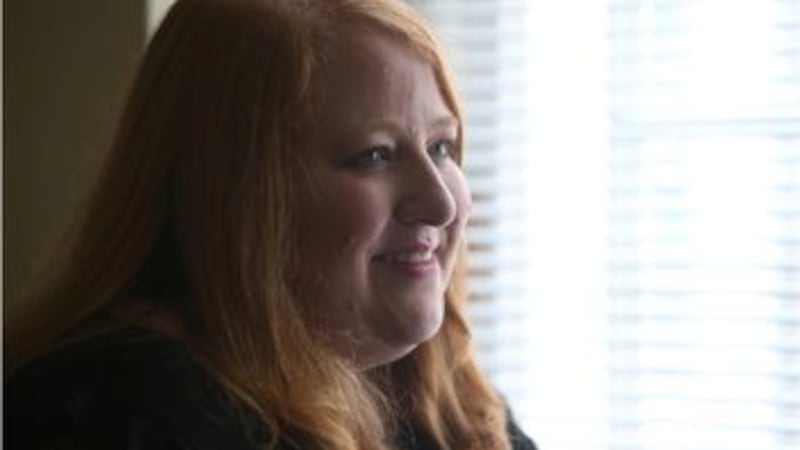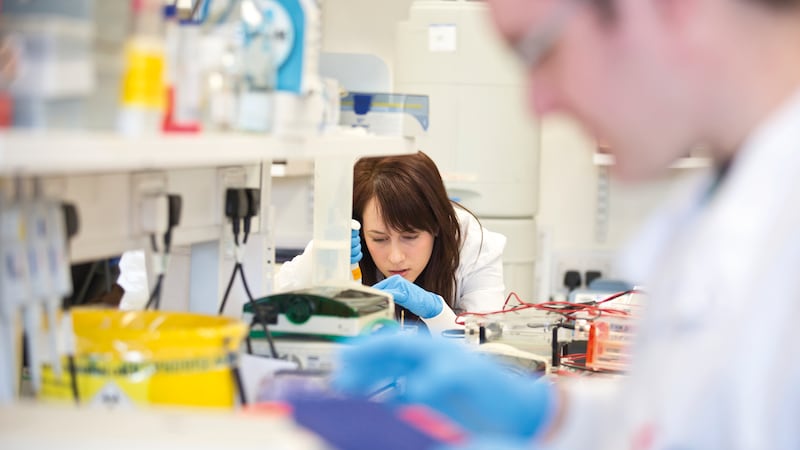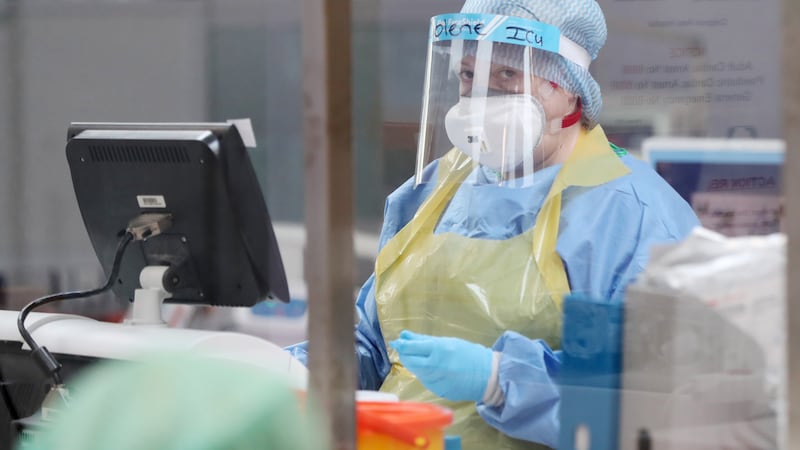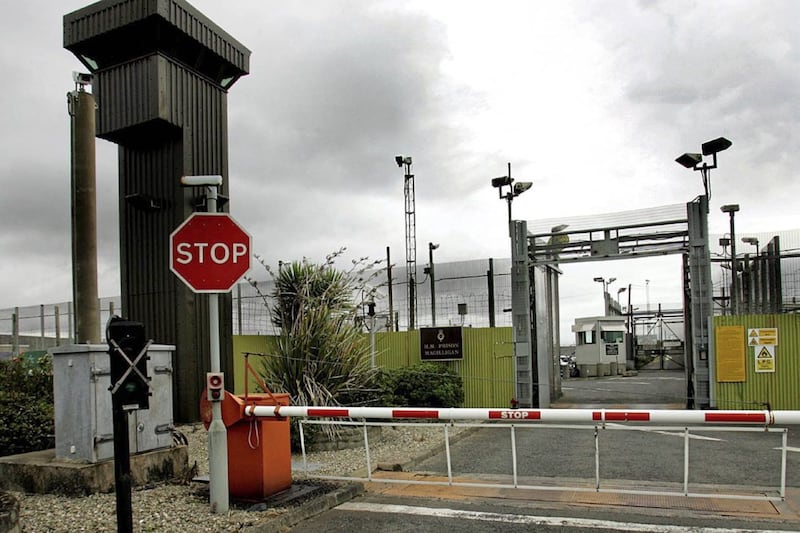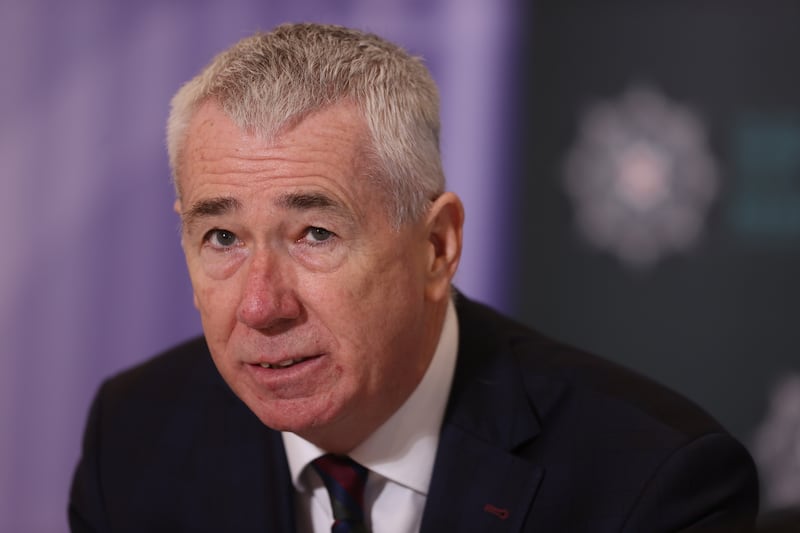I had always difficulties. Painful periods. Very heavy periods. I was always having to take time out of class [as a student at Bloomfield Collegiate].
I was one of those kids who was regularly in sick bay and always having to take very strong ibuprofen and hug a hot water bottle.
When I was coming up to do my GCSEs I was really worried how it may affect my exams. I went to the GP and I was prescribed the pill.
That kept the problem at bay. It wasn't until I was married for a couple of years that I thought I'd come off the pill because I didn't want to take it for such a protracted length of time.
I was hoping by then that because I was a bit older things would have settled down. But they hadn’t. The heavy and painful periods came back over time.
On some days of the month I would struggle to make it to work.
At times I almost doubted myself. I assumed it was just me being a bit less equipped to deal with it than most people or in some way I was making a mountain out of a molehill.
I wasn’t aware that there could be a medical issue behind it all.
It wasn’t until I was in my 30s that I was diagnosed with endometriosis, [which occurs when cells that normally line the womb are found elsewhere in the body such as on the ovaries or fallopian tubes, and around the womb near the bladder and/or bowel.]
I WAS TOLD IT WAS IRRITABLE BOWEL SYNDROME
The doctor suggested when I was in my 20s that it was Irritable Bowel Syndrome. Then as the endometriosis became more severe I thought it might be a food allergy.
In my late 30s it became unmanageable. I was suffering from severe nausea and a severely upset stomach for two weeks out of every month - during my period but when I was ovulating as well. Sometimes my periods would last 10 to12 days.
I was barely fit for work and I would go home at night and just go to bed. I would have to cancel plans at the weekend because I was so drained.
I COLLAPSED ON HOLIDAY WITH MY HUSBAND
I was on holiday in England with my husband Michael and got up to go to the toilet one night when I collapsed in a heap.
After a trip to casualty I came back to Northern Ireland and sought help again.
I was referred as part of a waiting list management initiative to 3fivetwo Healthcare.
It was the first time I had seen a consultant. I was referred to the allergy clinic and referred to have a colonoscopy and an endoscopy. I was also referred to a Gynaecology specialist for a laparoscopy.
All results came back clear but for the laparoscopy. I had two very large cysts on each ovary. One was about the size of a grapefruit. One about the size of an orange.
They removed them through the laparoscopic surgery and also removed the rest of the endometrial tissue that had built up in my pelvis.
The consultant also gave a drug for the bleeding which reduced my periods down to two three days. That was a massive change.
For about 18 months I felt great but then I started to notice the symptoms coming back.
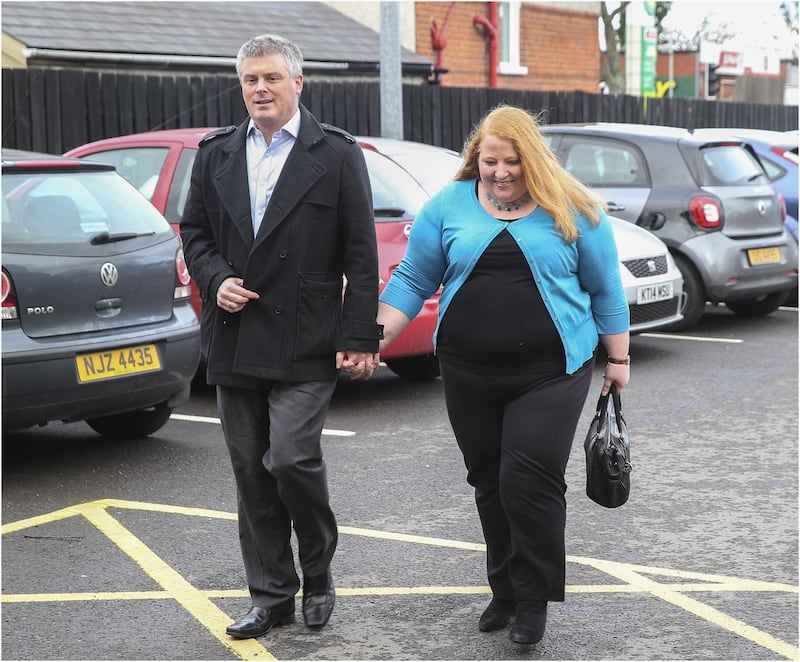
MICHAEL AND I HAD NEVER GONE OUT OF OUR WAY TO TRY AND START A FAMILY
Not everyone with endometriosis has difficulty having children and not everyone who has difficulty having children has endometriosis.
But it is not unusual for the condition to be discovered when couples begin to try for a baby.
Michael and I never went out of our way to try and start a family. Had it happened it would have been fine but if it didn't we weren't really concerned. So we didn't really pursue it as aggressively in our 20s as if we would have if we had desperately wanted a family.
For me getting the initial referral to a specialist took the best part of 20 years even though I had been going to the GP repeatedly with complaints.
I don’t know if maybe part of the problem was that I wasn't aware just how extreme my symptoms actually where.
A year and a half after the laparoscopic surgery I had two really bad episodes while I was an MP flying back and forth to Westminster.
In 2013, I ended up in St Thomas’s Hospital in London for four days. I had new cysts on my ovaries which had ruptured. The only thing that could ease the pain was a morphine drip.
The following year I was admitted to Ulster hospital in excruciating pain with a repeat incident.
I was given the injections to stop my ovaries working for six months to rest my system and see if things would settle down. It did for a while.
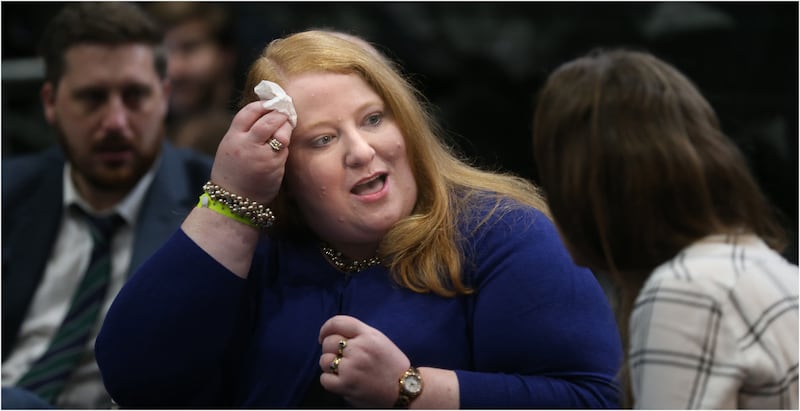
THE CANCER SCARE
The pain returned. I went for blood tests with my GP. He did blood tests which showed my cancer marker was slightly elevated.
Many of the symptoms that come with ovarian cysts are similar to the symptoms you have with ovarian cancer. Yet for years I was being diagnosed with having Irritable Bowel Symdrom.
Luckily I wasn’t dealing with cancer but it highlights why early investigation and diagnosis is absolutely crucial.
I had a scan and they were reasonably sure that it was just Endometriosis. Again I had two cysts, both bigger than 5cm.
I needed surgery again. This time I would opt for a hysterectomy.
That was November 2016. I had just become Alliance Party leader and politically things were about to go haywire [because of the Renewable Heating Initiative crisis].
Fitting in surgery became an issue because the Assembly collapsed in early 2017 and an election was called in March.
I delayed the surgery until April. Then a General Election was called in June and I delayed again.
I COLLAPSED DURING A LEADERS’ DEBATE
After the Assembly election I got bronchial pneumonia. Because I was constantly battling pain I was drained and run down.
The pain meant that I was constantly feeling too hot. On the day of one of the leaders’ debate in a hot studio I was in mid flow. I remember I was answering a question and just felt myself floating away.
It was pre recorded so ITV was able to stop the debate. Once I had cooled down I was fine.
In the end I went back to see the consultant and they gave me another injection to stop me ovulating three months.
I eventually went in and had my surgery in August 2017.
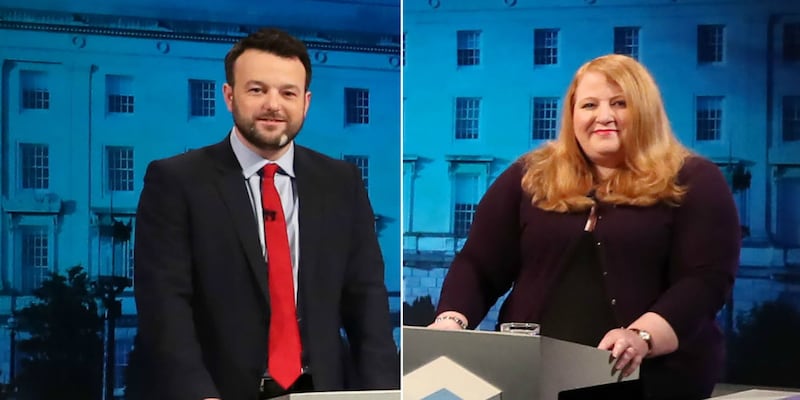
OPTING FOR A HYSTERECTOMY
At 45 a hysterectomy wasn't what I was thinking of. I was quite emotional about it.
It's odd that something that has cost me such hassle my entire adult life - that I should then feel so emotionally attacked at the same time.
I was also offered the option of another laparoscopic surgery. But looking at it on balance with my age and because I wasn't going to have a family it made more sense to have the hysterectomy now and get all that out of the way when I was still young and healthy.
Six months past my surgery I feel great.
I am now pain free. Lots of women are not so lucky. The waiting lists for elective surgery for such operations can be years. I got taken quickly because of my raised cancer indicators.
I was saying to Michael it is just nice to know that if we are going away for the weekend that I am not checking the diary to see if that would be one of ‘those’ weekends where we book a nice hotel and I spend the whole time in the hotel room with a hot water bottle. We had so many holiday breaks that were like that.
WOMEN NEED TO BE OFFERED MORE SUPPORT
Everybody’s case will be very different. But if your periods are so heavy and debilitating and you can’t go to work then that is not how it should be. It’s not just part of being a woman. It is potentially an indicator that something might be wrong.
Go to your doctor and say I don’t think this is normal and I need specialist help.
If I had known that when I was younger it would have made a massive difference to my quality of life.
WE NEED A SPECIALIST WOMENS' CLINIC AND BETTER GYNAE EDUCATION IN SCHOOLS
There is a real challenge around women's medicine and awareness. Having some kind of specialist gynaecology centre in Northern Ireland would help. In other parts of the UK they have women’s regional medical centres.
With the best will in the world your GP sees dozens of people every day with very different complaints. They are not going to be a specialist in terms of gynae.
We also need to educate children in school about what is normal and what is not when it comes to reproductive health. We are so quick to talk to them about diet and exercise but your health is about much more than that.
It includes your reproductive health and if you are not talking to kids about that when they are young you are perhaps inadvertently creating the myth that this is not something we talk about.
It makes it taboo. I found it very difficult to raise it with my mum when I was 16 and to go to the doctor and start to talk to the doctor what was going on.
Too many women learn to normalise pain they experience during their period and do not to talk about it.
